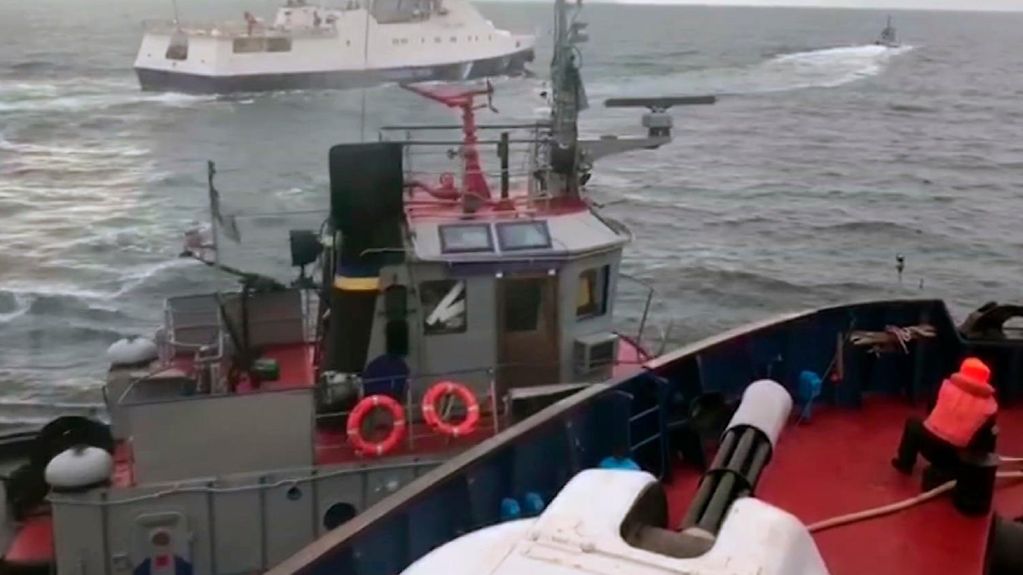Incident in the Sea of Azov
Following the escalation of the conflict between Russia and Ukraine in the Strait of Kerch, the German government has called for restraint. Federal government spokesperson Steffen Seibert condemned the seizure of a Ukrainian coastguard vessel by a Russian warship and called for the sailors to be released immediately.
4 min reading time

The incident took place at the bridge that links Russia and the unlawfully annexed Crimean peninsula
Photo: picture alliance/AP Photo
The German government is monitoring the situation, following the incident in the Strait of Kerch, with concern, said government spokesperson Steffen Seibert at the government press conference on Wednesday.
"What we need now is restraint and dialogue," stressed Steffen Seibert. The German government expects Russia to release the arrested sailors and return the vessels seized. "In the name of the German government I also criticise the way Ukrainian prisoners were shown on Russian television."
On 25 November 2018, Russia refused to allow Ukrainian ships to pass through the Strait of Kerch into the Sea of Azov, at the bridge, opened in 2018, between the Russian mainland and Crimea, which was unlawfully annexed by Russia in 2014. One Ukrainian vessel was rammed by a Russian ship, and three Ukrainian ships were seized. Several of the Ukrainian crew members are said to have been injured. The sailors have been remanded in custody until January 2019. The prisoners were shown on Russian television where they accused themselves of violating the border.
No justification for military force
Chancellor Angela Merkel has spoken by telephone about this incident with both the Ukrainian President Petro Poroshenko and the Russian President Vladimir Putin. She called for restraint and dialogue between the parties, reported Steffen Seibert.
Germany sees "no justification for the use of military force on the part of Russia," stressed the spokesperson. He reiterated the fact that Germany supports the full sovereignty and territorial integrity of Ukraine. "This naturally includes shipping rights in the Strait of Kerch and access to the Sea of Azov."
Restrictions on international shipping unacceptable
It is fully clear, he said, "There can be no restrictions imposed on international shipping in the Sea of Azov – particularly not to the detriment of Ukraine and its ports there." The German government called on both sides to enter swiftly into a dialogue and investigate this incident thoroughly.
Rainer Breul, spokesperson of the Federal Foreign Office, added that Federal Minister for Foreign Affairs, Heiko Maas had already spoken to his Russian counterpart Sergei Lavrov by telephone about the incident. They had discussed ways of analysing the incident with the involvement of Russian and Ukrainian border management experts. "The most important thing now is to share the facts," said Rainer Breul.
He added, "Our legal position is quite clear. The annexation of Crimea was and is unlawful. Secondly, the construction of the Kerch bridge is also unlawful, because Ukraine was not involved."
In terms of international law, the Federal Foreign Office assumes the Sea of Azov and the Strait of Kerch to be "internal waters" that are to be managed and used jointly by Ukraine and Russia. The use of the waters is regulated in an agreement, the Russian-Ukrainian cooperation treaty signed on 24 December 2003. Article 2 (1) of this treaty provides for freedom of navigation through the straits for ships of both parties. This expressly also applies to military vessels of both parties in both the Sea of Azov and the Kerch strait, without restriction or authorisation by the other state.
Sanctions remain on the agenda
Government spokesperson Steffen Seibert said that Germany must discuss any possible extension of sanctions with its European partners. They voted unanimously this summer to extend the level 3 economic sanctions on Russia until 31 January 2019. The question of extending these sanctions will thus only arise in a few weeks, he added. "The focus for us is currently to de-escalate the situation in the Strait of Kerch and on immediate assistance for the individuals imprisoned."
Federal Foreign Office spokesperson Rainer Breul added that sanctions have consequences and must be "carefully considered and discussed". This debate would be continued now, whereby Germany has already clearly stated "its expectations of Russia." Russia now has the chance to respond.
Gas transit still important for Ukraine
Government spokesperson Steffen Seibert pointed to the political dimension of the Nord Stream 2 pipeline project. This business project must take into account the future role of Ukraine in gas transit. "We have always stressed that clarity is needed on this point," he declared. This is why the German government is monitoring current tensions very closely. And that is why it is good that talks are being conducted between the EU, Ukraine and Russia about continued gas transit after 2019.
"Ukraine must retain its role as a transit country, which is why we will do what we can to support these talks." It is in the interests of Germany and of Europe, and the Chancellor has informed the Russian side of this, said the spokesperson unequivocally.